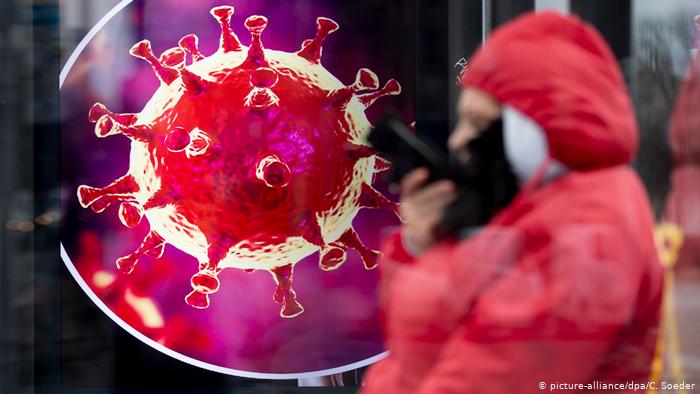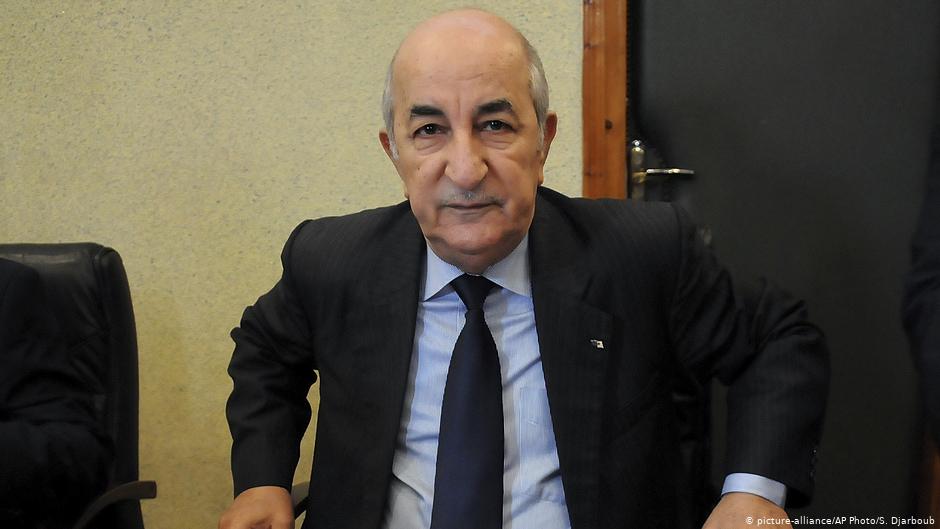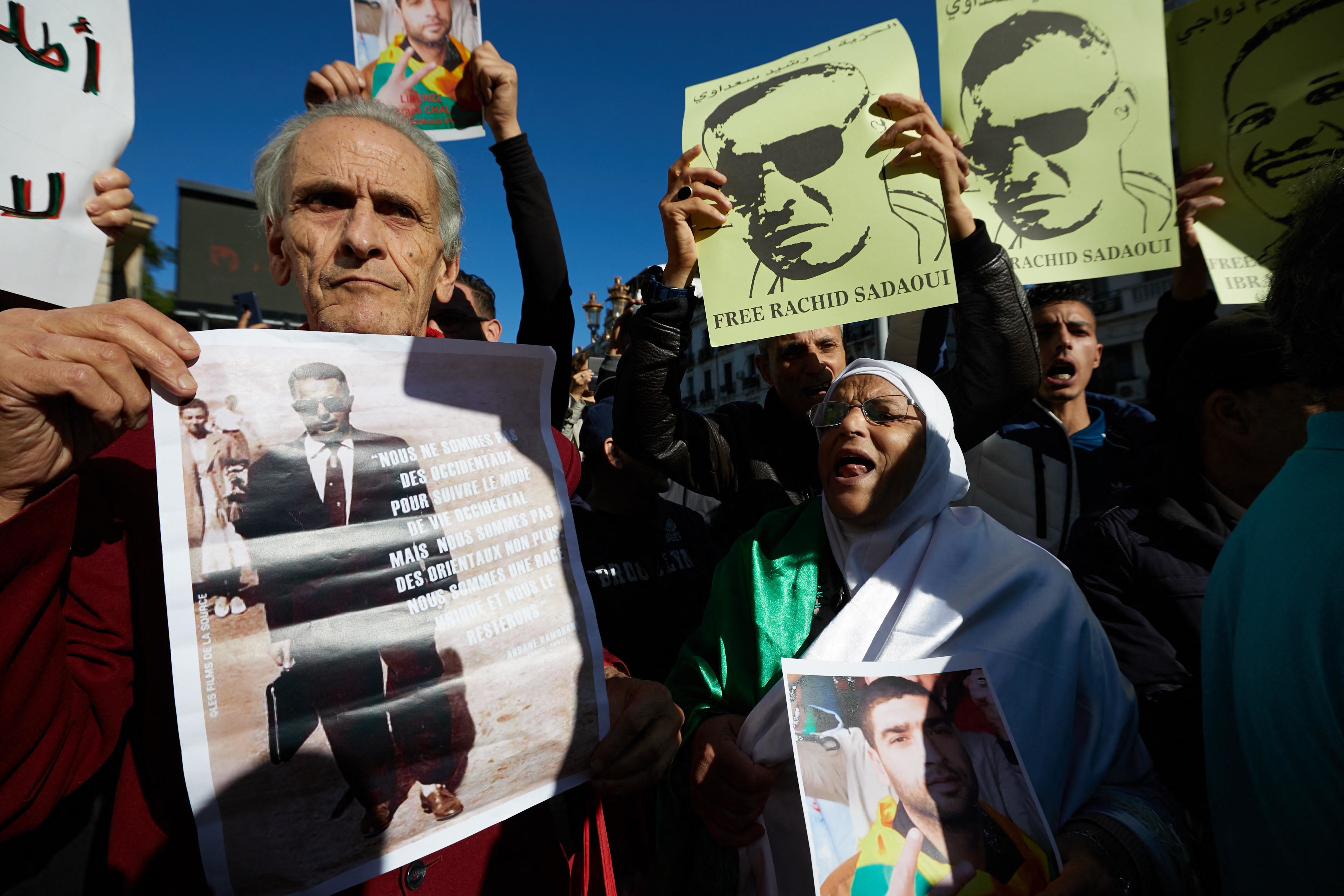Coronavirus halts year-long protests in Algeria

Since mass mobilisation against the authoritarian state leadership first began in February 2019, it seemed that nothing could stand in the way of Algeria’s protest movement. Neither political concessions such as the resignation of ex-President Abdelaziz Bouteflika in April 2019 – enforced by the military – nor diversionary tactics by the old elites could persuade young people pushing for genuine political change to halt their weekly demonstrations.
For 13 months, the campaign known in Algeria as “Hirak“ (Arabic for “movement“) defied government attempts to divide and discredit it, pouring rain and political repression. The mobilisation power of Hirak remained unbroken. Until the outbreak of the coronavirus pandemic.
“Neither the coronavirus nor cholera will stop us”
The authorities confirmed the first case of Covid-19 in Algeria in late February, but the Hirak juggernaut rolled enthusiastically onward, acknowledging the looming threat with bare-faced sarcasm. “Neither the coronavirus nor cholera will stop us” or “We’re not afraid of corona, we grew up in misery” were just two of the slogans heard on the streets of Algiers as late as 13 March.
All the while, there was an explosion in the number of cases. Hirak was also very much aware that Algeria’s public healthcare system, run down for decades, is nowhere near ready for such a crisis and that sooner or later, it could implode under the pressure of a pandemic of global dimensions.

With fitting urgency, more and more leading voices within the movement warned of the health policy dangers of COVID-19 and argued for an immediate halt to protests. Their calls were heeded. This is why since 13 March, for the first time after 57 weeks of non-stop protests, the streets of Algeria are now eerily empty.
By calling a halt to its Tuesday and Friday rallies, Hirak has also therefore shelved its most effective means of leverage by far. The consequences for the movement, its associated civil society groups and political parties should not be underestimated.
State apparatus ramps up repressive measures
After all, since the temporary end to the demonstrations, domestic authorities and pro-elite sections of the judiciary have stepped up actions against the opposition, the protest movement and free media. Since the end of March, there has been a veritable barrage of detentions, convictions and citations of members of the opposition and Hirak activists, while the authorities move to systematically undermine and tangibly restrict freedoms thus far in place for anti-government media.

As early as 24 March, in a controversial appeal process, a court in Algiers handed down a one-year prison sentence to the left wing politician Karim Tabbou, an extremely popular figure within Hirak. Numerous Algerian and international human rights groups sharply condemned the trial against the head of the opposition party Union Democratique et Sociale (UDS), a trial that began in the absence of his lawyers, who were kept just as much in the dark over the scheduling of the hearing as Tabbou himself. The opposition is describing this as a “judicial scandal”.
Tabbou’s sentencing looks to have been only the start of a robust campaign by the authorities against the opposition. Immediately after the conviction of Hirak activist Ibrahim Daouadji to six months in prison for alleged “publications on Facebook that undermine national unity”, the Sidi M’hamed court in Algiers, known for its politically motivated judgements, sentenced the president of the youth association Rassemblement Actions Jeunesse (RAJ), Abdelouhab Fersaoui, to one year in prison.
Just as in Tabbou’s case, Fersaoui’s sentence triggered a storm of indignation. In a joint declaration, more than 80 human rights groups and associations as well as innumerable activists and academics from Algeria, Morocco and Tunisia vehemently condemned Fersaoui’s “arbitrary detention” and demanded an immediate end to repressive measures and the unconditional release of all political prisoners in the country.
Authorities home in on anti-government media
Meanwhile in recent weeks dozens of Hirak activists were summoned for questioning on their political activities by the judicial police – one of the country’s most influential domestic authorities – and officials are now also taking specific action against anti-government media.
The Reporters Without Borders correspondent and co-founder of the Internet newspaper Casbah Tribune, Khaled Drareni, was arrested in Algiers at the end of March. The young reporter is one of the nation’s best-known journalists; arrested several times in 2019 during demonstrations but always released after a few hours in police custody – with no legal action taken against him. In March however, the judiciary did launch an investigation into Drareni’s activities for the first time.

Just a week later, a court in Algiers sentenced Sofiane Merakchi to eight months in jail. The reporter, who works for the Lebanese TV channel Al-Mayadeen, had already been detained last autumn and became the first Algerian journalist not to be released after his arrest but brought before the court by the judiciary. At least two other media representatives are currently behind bars, with investigations against three more launched in early April.
Since last week meanwhile, several anti-government news sites in Algeria can no longer be called up. The authorities barred access to the websites of the media portals Maghreb Emergent and TSA Algerie as well as the Internet radio station Radio M.
Political exploitation of the corona pandemic
In view of this latest wave of repressive measures, the promises issued so wholeheartedly by President Abdelmajid Tebboune in late 2019 now sound like some kind of cruel joke. The head of state, newly “elected” in December in a controversial poll overshadowed by accusations of manipulation, had pledged political reforms after taking office and rhetorically held out his hand to Hirak.
However for the ruling classes – an opaque network of public bureaucracy, military leaders, politicians and private business elites – these were clearly nothing more than empty words. The protest hiatus now presents these elites with an opportunity to try once more to crush Hirak and prepare themselves for the post-pandemic era with attempts at intimidation and repressive actions.[embed:render:embedded:node:39498]
Thus far, however, the government has not cut a good figure in its approach to the COVID-19 crisis. While Tebboune and his team of ministers insistently repeat the mantra that Algeria’s public hospitals are adequately prepared for the pandemic, for weeks doctors and trade unions have been telling Algerian newspapers about an acute lack of protective gear, disinfectant and ventilators.
Crisis management skills?
The regime has withstood pressure from the streets for the moment, but now those elites stubbornly clinging on to their privileges must prove that they are in a position to avert a health policy disaster at home. However, should the pandemic actually end in a fiasco – as many observers have already predicted – the danger is that simmering anti-government fury could boil over once more.
For Hirak, this complex situation is more than paradoxical. After all, a COVID-19 disaster could act as a catalyst for the movement, motivating new sections of the populace to take part in the protests.
Memories of the massive wave of protests and strikes in Algeria’s health system in early 2018 are still very much alive; and this is significant in consideration of such a scenario. At the time, independent trade unions had been issuing warnings for several months about catastrophic conditions within the healthcare system and demanded that the government take action. But the administration sat back and did nothing. If this scenario were to repeat itself in the coming months, this would put the ruling classes under enormous pressure.
Sofian Philip Naceur
© Qantara.de 2020
Translated from the German by Nina Coon
